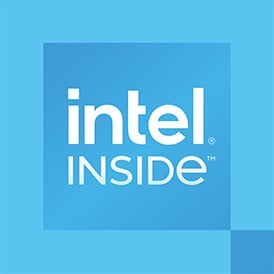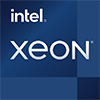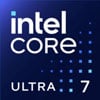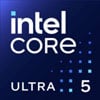
Intel Processor N100 Benchmark, test e specifiche
Ultimo aggiornamento:
Il Intel Processor N100 ha 4 core con 4 thread ed è basato sul 13. Gene della serie Intel Processor N. Il processore utilizza una scheda madre con il socket BGA ed è stato rilasciato in Q1/2023. Intel Processor N100 ottiene 989 punti nel benchmark single-core di Geekbench 5. Nel benchmark multi-core di Geekbench 5, il risultato è 2.840 punti.

| Cognome: | Intel Processor N100 |
|---|---|
| Famiglia: | Intel Processor N (5) |
| Gruppo CPU: | Intel Processor N50/N100/N200 (5) |
| Architettura : | Alder Lake N |
| Segmento: | Mobile |
| Generazione: | 13 |
| Predecessore: | -- |
| Successore: | -- |
CPU Cores e frequenza di base
Intel Processor N100 ha 4 core CPU e può calcolare 4 thread in parallelo. La frequenza di clock di Intel Processor N100 è 1,80 GHz (3,40 GHz). Il numero di core della CPU influisce notevolmente sulla velocità del processore ed è un importante indicatore delle prestazioni.
| CPU Cores / Threads: | 4 / 4 |
|---|---|
| Architettura principale: | normal |
| Cores: | 4x Gracemont |
| Hyperthreading / SMT: | No |
|---|---|
| Overclocking: | No |
| Frequenza: | 1,80 GHz |
| Turbo Frequenza (1 Core ): | 3,40 GHz |
| Turbo Frequenza (4 Cores): | 3,00 GHz |
Grafica interna
Intel Processor N100 ha una grafica integrata, chiamata iGPU in breve. Nello specifico, Intel Processor N100 utilizza Intel UHD Graphics 24 EUs (Alder Lake), che ha 192 texture shader e 24 unità di esecuzione. L'iGPU utilizza la memoria principale del sistema come memoria grafica e si trova sul die del processore.
| nome GPU: | Intel UHD Graphics 24 EUs (Alder Lake) |
|---|---|
| Frequenza GPU : | 0,30 GHz |
| GPU (Turbo ): | 0,75 GHz |
| Unità di esecuzione: | 24 |
| Shader: | 192 |
| Hardware Raytracing: | No |
| Data di lancio : | Q1/2023 |
| Max. visualizzazioni: | 3 |
|---|---|
| Generation: | 12 |
| Direct X: | 12 |
| Tecnologia : | 10 nm |
| Max. GPU Memoria: | 8 GB |
| Frame Generation: | No |
Hardware codec support
Un codec fotografico o video accelerato nell'hardware può accelerare notevolmente la velocità di lavoro di un processore e prolungare la durata della batteria di notebook o smartphone durante la riproduzione di video.
| h265 / HEVC (8 bit): | Decodificare / Codificare |
|---|---|
| h265 / HEVC (10 bit): | Decodificare / Codificare |
| h264: | Decodificare / Codificare |
| VP8: | Decodificare / Codificare |
| VP9: | Decodificare / Codificare |
| AV1: | Decodificare |
|---|---|
| AVC: | Decodificare / Codificare |
| VC-1: | Decodificare |
| JPEG: | Decodificare / Codificare |
Memoria & PCIeIl processore può utilizzare fino a 16 GB memoria in 1 (Single Channel) canali di memoria. La larghezza di banda massima della memoria è 38,4 GB/s. Il tipo di memoria e la quantità di memoria possono influire notevolmente sulla velocità del sistema. |
|
| Tipo di memoria : | Banda di memoria: |
|---|---|
| DDR5-4800 DDR4-3200 | 38,4 GB/s 25,6 GB/s |
| Max. Memoria: | 16 GB |
| Canali di memoria : | 1 (Single Channel) |
| ECC: | No |
| PCIe: | 3.0 x 9 |
| PCIe Larghezza di banda: | 8,9 GB/s |
Gestione termicaLa potenza di progettazione termica (TDP in breve) del processore è 6 W. Il TDP specifica la soluzione di raffreddamento necessaria per raffreddare sufficientemente il processore. Il TDP di solito dà un'idea approssimativa dell'effettivo consumo energetico della CPU. |
|
|---|---|
| TDP (PL1 / PBP): | 6 W |
| TDP (PL2): | 25 W |
| TDP up: | 10 W |
| TDP down: | -- |
| Tjunction max.: | 105 °C |
Dettagli tecnici
Il Intel Processor N100 è realizzato in 10 nm. Più piccolo è il processo di produzione di una CPU, più è moderna ed efficiente dal punto di vista energetico. Nel complesso, il processore ha 10,00 MB cache. Una cache di grandi dimensioni può accelerare notevolmente la velocità del processore in alcuni casi, ad esempio nei giochi.
| Tecnologia : | 10 nm |
|---|---|
| Design a chip: | Monolitico |
| Presa: | BGA |
| L2-Cache: | 4,00 MB |
| L3-Cache: | 6,00 MB |
| AES-NI: | Si |
| Sistemi operativi: | Windows 10, Windows 11, Linux |
| Virtualizzazione: | VT-x, VT-x EPT, VT-d |
|---|---|
| Set di istruzioni (ISA): | x86-64 (64 bit) |
| Estensioni ISA: | SSE4.1, SSE4.2, AVX, AVX2 |
| Data di lancio : | Q1/2023 |
| Prezzo di rilascio: | 128 $ |
| Numero di parte: | -- |
| Documenti: | Scheda tecnica |
Valuta questo processore
Risultati di benchmark

I risultati del benchmark per Intel Processor N100 sono stati attentamente controllati da noi. Pubblichiamo solo risultati di benchmark che sono stati creati da noi o che sono stati inviati da un visitatore e poi controllati da un membro del team. Tutti i risultati sono basati e rispettano le nostre linee guida di benchmark.
Schermate:
Schermate:
- Cinebench R23 on ASRock N100DC-ITX (16 GB DDR4-3200, Windows 11 Pro)
- Cinebench R20 on ASRock N100DC-ITX (16 GB DDR4-3200, Windows 11 Pro)
- Geekbench 6.1.0 on ASRock N100DC-ITX (16 GB DDR4-3200, Windows 11 Pro)
- Geekbench 5.5.1 on ASRock N100DC-ITX (16 GB DDR4-3200, Windows 11 Pro)
- CPU-Z Benchmark 17 on ASRock N100DC-ITX (16 GB DDR4-3200, Windows 11 Pro)
- AIDA64 Cache & Memory Benchmark on ASRock N100DC-ITX (16 GB DDR4-3200, Windows 11 Pro)
- 3DMark Time Spy on ASRock N100DC-ITX (16 GB DDR4-3200, Windows 11 Pro)
- AIDA64 CPU Info on ASRock N100DC-ITX (16 GB DDR4-3200, Windows 11 Pro)
Cinebench 2024 (Single-Core)
Il benchmark Cinebench 2024 si basa sul motore di rendering Redshift, utilizzato anche nel programma 3D di Maxon Cinema 4D. Le corse di benchmark durano 10 minuti ciascuna per testare se il processore è limitato dalla generazione di calore.

|
AMD Ryzen 5 2400G
4C 8T @ 3,90 GHz |
||

|
AMD Ryzen 7 1800X
8C 16T @ 4,00 GHz |
||

|
AMD Ryzen Threadripper 1950X
16C 32T @ 4,00 GHz |
||
|
|
Intel Processor N100
4C 4T @ 3,40 GHz |
||

|
AMD Ryzen 5 1600X
6C 12T @ 3,70 GHz |
||

|
Intel Processor N95
4C 4T @ 3,40 GHz |
||

|
Intel Core i5-8259U
4C 8T @ 3,80 GHz |
||
Cinebench 2024 (Multi-Core)
Il test Multi-Core del benchmark Cinebench 2024 utilizza tutti i core della CPU per eseguire il rendering utilizzando il motore di rendering Redshift, utilizzato anche in Maxons Cinema 4D. L'esecuzione del benchmark dura 10 minuti per verificare se il processore è limitato dalla generazione di calore.

|
AMD Ryzen 3 3200G
4C 4T @ 4,00 GHz |
||

|
Qualcomm Snapdragon Microsoft SQ1
8C 8T @ 3,00 GHz |
||

|
Intel Core i5-4590
4C 4T @ 3,70 GHz |
||
|
|
Intel Processor N100
4C 4T @ 3,40 GHz |
||

|
Intel Core i7-4710HQ
4C 8T @ 3,50 GHz |
||

|
Intel Core i7-8550U
4C 8T @ 4,00 GHz |
||

|
Intel Processor N95
4C 4T @ 3,40 GHz |
||
Cinebench R23 (Single-Core)
Cinebench R23 è il successore di Cinebench R20 ed è anch'esso basato su Cinema 4D. Cinema 4D è un software usato a livello mondiale per creare forme in 3D. Il test single-core utilizza solo un nucleo elaborativo della CPU. A tal fine, il numero di nuclei elaborativi o la capacità di hyperthreading non sono rilevanti.

|
Intel Xeon E5-2699 v4
22C 44T @ 3,60 GHz |
||

|
AMD Ryzen 7 2700U
4C 8T @ 3,80 GHz |
||

|
AMD Ryzen 7 PRO 2700U
4C 8T @ 3,80 GHz |
||
|
|
Intel Processor N100
4C 4T @ 3,40 GHz |
||

|
Intel Core i7-3770
4C 8T @ 3,90 GHz |
||

|
Intel Core i3-8100T
4C 4T @ 3,10 GHz |
||

|
Intel Core i5-4590
4C 4T @ 3,70 GHz |
||
Cinebench R23 (Multi-Core)
Cinebench R23 è il successore di Cinebench R20 ed è anch'esso basato su Cinema 4D. Cinema 4D è un software usato a livello mondiale per creare forme in 3D. Il test multi-core coinvolge tutti i nuclei elaborativi della CPU e si avvale del hyperthreading.

|
Intel Pentium G4560
2C 4T @ 3,50 GHz |
||

|
Intel Core i3-10110U
2C 4T @ 3,20 GHz |
||

|
Intel Core i3-1005G1
2C 4T @ 3,40 GHz |
||
|
|
Intel Processor N100
4C 4T @ 3,00 GHz |
||

|
Intel Xeon X3440
4C 8T @ 2,53 GHz |
||

|
Intel Celeron N5095A
4C 4T @ 2,50 GHz |
||

|
Intel Celeron N5095
4C 4T @ 2,50 GHz |
||
Geekbench 5, 64bit (Single-Core)
Geekbench 5 è un benchmark multi-piattaforma che usa in modo intensivo la memoria del sistema.Il test single-core utilizza solo un nucleo elaborativo della CPU. A tal fine, il numero di nuclei elaborativi o la capacità di hyperthreading non sono rilevanti.

|
Intel Xeon E5-2699 v4
22C 44T @ 3,60 GHz |
||

|
Sony Playstation 5
8C 16T @ 3,50 GHz |
||

|
Intel Core i5-10500TE
6C 12T @ 3,70 GHz |
||
|
|
Intel Processor N100
4C 4T @ 3,40 GHz |
||

|
Intel Core i5-8257U
4C 8T @ 3,90 GHz |
||

|
AMD Ryzen 5 2500X
4C 8T @ 4,00 GHz |
||

|
AMD EPYC 7232P
8C 16T @ 3,20 GHz |
||
Geekbench 5, 64bit (Multi-Core)
Geekbench 5 è un benchmark multi-piattaforma che usa in modo intensivo la memoria del sistema.Il test multi-core coinvolge tutti i nuclei elaborativi della CPU e si avvale del hyperthreading.

|
AMD Ryzen 5 3550H
4C 8T @ 3,00 GHz |
||

|
Qualcomm Snapdragon 778G
8C 8T @ 2,40 GHz |
||

|
Samsung Exynos 1380
8C 8T @ 2,40 GHz |
||
|
|
Intel Processor N100
4C 4T @ 3,00 GHz |
||

|
AMD FX-8370
8C 8T @ 4,15 GHz |
||

|
Intel Core i7-3635QM
4C 8T @ 2,40 GHz |
||

|
Intel Core i5-4670
4C 4T @ 3,60 GHz |
||
Geekbench 6 (Single-Core)
Geekbench 6 è un punto di riferimento per computer, notebook e smartphone moderni. Ciò che è nuovo è un utilizzo ottimizzato delle architetture CPU più recenti, ad esempio basate sul concetto big.LITTLE e combinando core CPU di diverse dimensioni. Il benchmark single-core valuta solo le prestazioni del core della CPU più veloce, il numero di core della CPU in un processore è irrilevante qui.

|
Intel Core i5-8600T
6C 6T @ 3,70 GHz |
||

|
Intel Xeon Gold 6130
16C 32T @ 3,70 GHz |
||

|
Intel Xeon Gold 6136
12C 24T @ 3,70 GHz |
||
|
|
Intel Processor N100
4C 4T @ 3,40 GHz |
||

|
AMD Ryzen 7 2700
8C 16T @ 4,10 GHz |
||

|
Intel Core i3-8145UE
2C 4T @ 3,90 GHz |
||

|
Intel Core i3-8145U
2C 4T @ 3,90 GHz |
||
Geekbench 6 (Multi-Core)
Geekbench 6 è un punto di riferimento per computer, notebook e smartphone moderni. Ciò che è nuovo è un utilizzo ottimizzato delle architetture CPU più recenti, ad esempio basate sul concetto big.LITTLE e combinando core CPU di diverse dimensioni. Il benchmark multi-core valuta le prestazioni di tutti i core della CPU del processore. I miglioramenti del thread virtuale come AMD SMT o l'Hyper-Threading di Intel hanno un impatto positivo sul risultato del benchmark.

|
AMD Ryzen 3 4300U
4C 4T @ 3,70 GHz |
||

|
Intel Core i5-6440EQ
4C 4T @ 3,00 GHz |
||

|
MediaTek Dimensity 1300
8C 8T @ 3,00 GHz |
||
|
|
Intel Processor N100
4C 4T @ 3,00 GHz |
||

|
Qualcomm Snapdragon 865+
8C 8T @ 3,10 GHz |
||

|
MediaTek Dimensity 1100
8C 8T @ 2,60 GHz |
||

|
AMD Ryzen 5 3550H
4C 8T @ 3,00 GHz |
||
Cinebench R20 (Single-Core)
Cinebench R20 è il successore di Cinebench R15 ed è anch'esso basato su Cinema 4D. Cinema 4D è un software usato a livello mondiale per creare forme in 3D. Il test single-core utilizza solo un nucleo elaborativo della CPU. A tal fine, il numero di nuclei elaborativi o la capacità di hyperthreading non sono rilevanti.

|
Intel Xeon Gold 6126
12C 24T @ 3,70 GHz |
||

|
Intel Core i3-1000NG4
4C 8T @ 3,20 GHz |
||

|
Intel Core i5-8250U
4C 8T @ 3,40 GHz |
||
|
|
Intel Processor N100
4C 4T @ 3,40 GHz |
||

|
Intel Core i5-5675C
4C 4T @ 3,60 GHz |
||

|
AMD Ryzen 7 1700X
8C 16T @ 3,80 GHz |
||

|
AMD Ryzen 5 1500X
4C 8T @ 3,70 GHz |
||
Cinebench R20 (Multi-Core)
Cinebench R20 è il successore di Cinebench R15 ed è anch'esso basato su Cinema 4D. Cinema 4D è un software usato a livello mondiale per creare forme in 3D. Il test multi-core coinvolge tutti i nuclei elaborativi della CPU e si avvale del hyperthreading.

|
AMD FX-8300
8C 8T @ 4,00 GHz |
||

|
Intel Core i3-7300
2C 4T @ 4,00 GHz |
||

|
AMD FX-8320
8C 8T @ 3,75 GHz |
||
|
|
Intel Processor N100
4C 4T @ 3,00 GHz |
||

|
Intel Core i3-1115G4
2C 4T @ 3,00 GHz |
||

|
Intel Core i5-6400
4C 4T @ 3,00 GHz |
||

|
Intel Xeon X3470
4C 8T @ 3,20 GHz |
||
iGPU - Prestazioni FP32 (GFLOPS a precisione singola)
Le prestazioni di calcolo teoriche dell'unità grafica interna del processore con precisione semplice (32 bit) in GFLOPS. GFLOPS indica quanti miliardi di operazioni in virgola mobile che l'iPPU può eseguire al secondo.

|
Intel Core i5-3570K
Intel HD Graphics 4000 @ 1,15 GHz |
||

|
Intel Core i7-3770
Intel HD Graphics 4000 @ 1,15 GHz |
||

|
Intel Core i7-3770K
Intel HD Graphics 4000 @ 1,15 GHz |
||
|
|
Intel Processor N100
Intel UHD Graphics 24 EUs (Alder Lake) @ 0,75 GHz |
||

|
Intel Core i3-4112E
Intel HD Graphics 4600 @ 0,90 GHz |
||

|
Intel Core i3-4110E
Intel HD Graphics 4600 @ 0,90 GHz |
||

|
Intel Core i5-4422E
Intel HD Graphics 4600 @ 0,90 GHz |
||
Risultati stimati da PassMark CPU Mark
Alcune delle CPU elencate di seguito sono stati sottoposti a benchmarking da CPU-monkey. Tuttavia, la maggior parte delle CPU non sono state testate e i risultati sono stati stimati utilizzando una formula segreta di proprietà di CPU-monkey. Come tali, essi non riflettono con precisione i valori attuali di Passmark CPU Mark e non sono stati approvati da PAssMark Software Pty Ltd.

|
AMD FX-6100
6C 6T @ 3,90 GHz |
||

|
Intel Core i5-4690S
4C 4T @ 3,50 GHz |
||

|
Intel Core i5-6440EQ
4C 4T @ 3,00 GHz |
||
|
|
Intel Processor N100
4C 4T @ 3,00 GHz |
||

|
AMD Phenom II X6 1065T
6C 6T @ 3,40 GHz |
||

|
Intel Xeon E3-1270
4C 8T @ 3,60 GHz |
||

|
AMD Ryzen 5 3500C
4C 8T @ 2,50 GHz |
||
CPU-Z Benchmark 17 (Single-Core)
Il benchmark CPU-Z misura le prestazioni di un processore misurando il tempo impiegato dal sistema per completare tutti i calcoli del benchmark. Più velocemente viene completato il benchmark, maggiore è il punteggio.

|
Intel Core i5-3570K
4C 4T @ 3,80 GHz |
||

|
Intel Core i7-3770K
4C 8T @ 3,90 GHz |
||

|
Intel Core i5-6500
4C 4T @ 3,40 GHz |
||
|
|
Intel Processor N100
4C 4T @ 3,00 GHz |
||

|
Intel Xeon E3-1231 v3
4C 8T @ 3,80 GHz |
||

|
Intel Core i7-8550U
4C 8T @ 2,40 GHz |
||

|
Intel Core i5-4570
4C 4T @ 3,40 GHz |
||
CPU-Z Benchmark 17 (Multi-Core)
Il benchmark CPU-Z misura le prestazioni di un processore misurando il tempo impiegato dal sistema per completare tutti i calcoli del benchmark. Più velocemente viene completato il benchmark, maggiore è il punteggio.

|
Intel Core i7-2860QM
4C 8T @ 2,50 GHz |
||

|
Intel Core i5-2500
4C 4T @ 3,30 GHz |
||

|
Intel Core i7-860
4C 8T @ 2,80 GHz |
||
|
|
Intel Processor N100
4C 4T @ 1,80 GHz |
||

|
Intel Core i5-3450
4C 4T @ 3,10 GHz |
||

|
Intel Core i3-1110G4
2C 4T @ 1,10 GHz |
||

|
Intel Core i7-2760QM
4C 8T @ 2,40 GHz |
||
Cinebench R15 (Single-Core)
Cinebench R15 è il successore di Cinebench 11.5 ed è anch'esso basato su Cinema 4D. Cinema 4D è un software usato a livello mondiale per creare forme in 3D. Il test single-core utilizza solo un nucleo elaborativo della CPU. A tal fine, il numero di nuclei elaborativi o la capacità di hyperthreading non sono rilevanti.

|
Intel Xeon E3-1225 v5
4C 4T @ 3,70 GHz |
||

|
Intel Xeon E5-2637 v4
4C 8T @ 3,70 GHz |
||

|
Intel Xeon E5-2643 v4
6C 12T @ 3,70 GHz |
||
|
|
Intel Processor N100
4C 4T @ 3,40 GHz |
||

|
AMD Ryzen 3 PRO 3200G
4C 4T @ 4,00 GHz |
||

|
AMD Ryzen 3 3200G
4C 4T @ 4,00 GHz |
||

|
Intel Core i3-8100
4C 4T @ 3,60 GHz |
||
Cinebench R15 (Multi-Core)
Cinebench R15 è il successore di Cinebench 11.5 ed è anch'esso basato su Cinema 4D. Cinema 4D è un software usato a livello mondiale per creare forme in 3D. Il test multi-core coinvolge tutti i nuclei elaborativi della CPU e si avvale del hyperthreading.

|
Intel Core i5-4570
4C 4T @ 3,40 GHz |
||

|
AMD Ryzen 3 2300U
4C 4T @ 2,00 GHz |
||

|
AMD Ryzen 3 PRO 2300U
4C 4T @ 2,00 GHz |
||
|
|
Intel Processor N100
4C 4T @ 3,00 GHz |
||

|
AMD Ryzen 3 PRO 1200
4C 4T @ 3,30 GHz |
||

|
AMD Ryzen 3 1200
4C 4T @ 3,10 GHz |
||

|
Intel Core i5-4590S
4C 4T @ 3,30 GHz |
||
Prestazioni della CPU per watt (efficienza)
Efficienza del processore a pieno carico nel benchmark Cinebench R23 (multi-core). Il risultato del benchmark è diviso per l'energia media richiesta (potenza del pacchetto CPU in watt). Più alto è il valore, più efficiente è la CPU a pieno carico.

|
Intel Core i7-1370P
12.933 CB R23 MC @ 51 W |
||

|
AMD Ryzen 9 7945HX
32.788 CB R23 MC @ 134 W |
||

|
AMD Ryzen 9 7900X3D
27.084 CB R23 MC @ 115 W |
||
|
|
Intel Processor N100
2.269 CB R23 MC @ 10 W |
||

|
AMD Ryzen 7 7730U
10.856 CB R23 MC @ 48 W |
||

|
Intel Core Ultra 7 155H
16.825 CB R23 MC @ 75 W |
||

|
Intel Core Ultra 5 125H
14.771 CB R23 MC @ 66 W |
||
Benchmarks

Cinebench 2024 (SC)
272 inserimenti
272 inserimenti

Cinebench 2024 (MC)
271 inserimenti
271 inserimenti

Cinebench R23 (SC)
586 inserimenti
586 inserimenti

Cinebench R23 (MC)
565 inserimenti
565 inserimenti

Geekbench 5 (SC)
2.488 inserimenti
2.488 inserimenti

Geekbench 5 (MC)
2.461 inserimenti
2.461 inserimenti

Geekbench 6 (SC)
1.755 inserimenti
1.755 inserimenti

Geekbench 6 (MC)
1.703 inserimenti
1.703 inserimenti

Cinebench R20 (SC)
656 inserimenti
656 inserimenti

Cinebench R20 (MC)
604 inserimenti
604 inserimenti

FP32 SP (iGPU)
2.039 inserimenti
2.039 inserimenti

3DMark Timespy (iGPU)
516 inserimenti
516 inserimenti

PassMark CPU-Mark
2.392 inserimenti
2.392 inserimenti

CPU-Z Benchmark 17 (SC)
231 inserimenti
231 inserimenti

CPU-Z Benchmark 17 (MC)
733 inserimenti
733 inserimenti

Cinebench R15 (SC)
1.106 inserimenti
1.106 inserimenti

Cinebench R15 (MC)
1.101 inserimenti
1.101 inserimenti

Prestazioni della CPU per watt (efficienza)
109 inserimenti
109 inserimenti
Descrizione del processore
Il processore Intel N100 è un piccolo ed efficiente processore a quattro core destinato a notebook economici e piccoli computer. Il processore utilizza 4 core del design Intel "Gracemont". Intel utilizza questi core anche nei processori più veloci della serie Intel Core i come core E.La frequenza di clock del processore Intel N100 è di soli 1,8 GHz. In modalità Turbo, il processore può adattare dinamicamente la sua frequenza di clock al carico e dissipare il calore e quindi raggiungere un massimo di 3,4 GHz su un core della CPU o un massimo di 3,2 GHz su tutti i core sotto carico.
Il processore Intel N100 si basa su una soluzione Intel UHD con 24 unità SM e 192 shader per la grafica integrata (iGPU). La grafica è quindi troppo lenta per i giochi attuali e meno recenti. Tuttavia, la grafica Intel UHD può accelerare i codec video più moderni nellhardware e quindi riprodurre quasi tutti i formati video in modo efficiente e fluido.
Il controller di memoria del processore Intel N100 è in grado di gestire la memoria DDR4 e DDR5 (LPDDR5). È possibile un massimo di 16 GB di RAM. Tuttavia, è del tutto plausibile che ufficiosamente siano possibili anche da 32 a 64 GB di RAM. Questo era anche ufficiosamente possibile con i modelli precedenti.
La larghezza di banda massima della memoria è di soli 38,4 GB al secondo, il che è dovuto principalmente al fatto che il processore Intel N100 ha un solo canale di memoria. Lo standard PCIe è supportato anche solo nella versione 3 con 9 linee, la versione attuale è PCIe 5.
Il TDP del processore è di soli 6 watt. Ciò consente al processore Intel N100 di essere raffreddato passivamente, cioè senza rumore della ventola, senza problemi. Il processore è prodotto in un processo a 10 nm da Intel, che la stessa Intel chiama "Intel 7" e lo confronta con la produzione a 7 nm di TSMC.
Il processore Intel N100 ha un totale di 10 MB di cache ed è stato presentato allinizio del 2023.
Confronti più popolari
Torna all'indice




